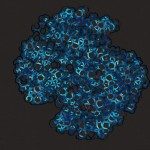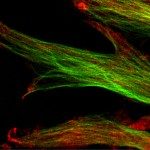Lien vers Pubmed [PMID] – 29795186
Lien DOI – 10.1038/s41467-018-04414-2
Nat Commun 2018 May; 9(1): 2027
Many bacterial proteins require specific subcellular localization for function. How Escherichia coli proteins localize at one pole, however, is still not understood. Here, we show that the DnaK (HSP70) chaperone controls unipolar localization of the Shigella IpaC type III secretion substrate. While preventing the formation of lethal IpaC aggregates, DnaK promoted the incorporation of IpaC into large and dynamic complexes (LDCs) restricted at the bacterial pole through nucleoid occlusion. Unlike stable polymers and aggregates, LDCs show dynamic behavior indicating that nucleoid occlusion also applies to complexes formed through transient interactions. Fluorescence recovery after photobleaching analysis shows DnaK-IpaC exchanges between opposite poles and DnaKJE-mediated incorporation of immature substrates in LDCs. These findings reveal a key role for LDCs as reservoirs of functional DnaK-substrates that can be rapidly mobilized for secretion triggered upon bacterial contact with host cells.


